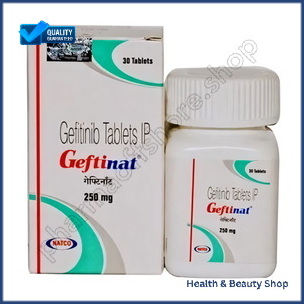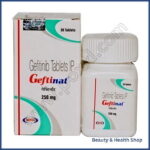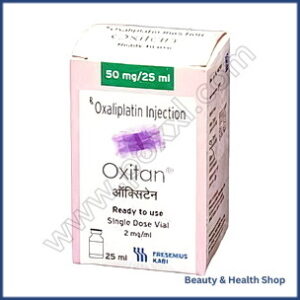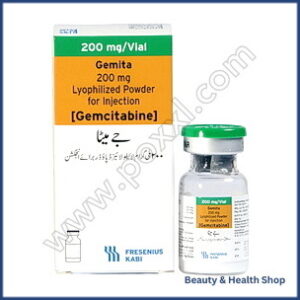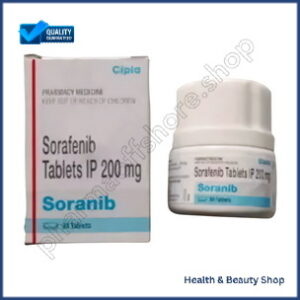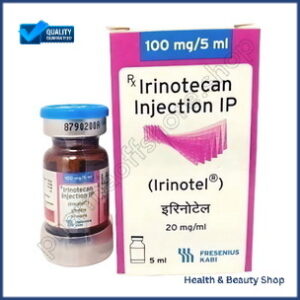ADDICTION
ALCOHOL DEPENDENCE
QUIT SMOKING
ALLERGY
ANTI FUNGAL
FUNGAL INFECTION
FUNGAL NAIL INFECTIONS
ANTI-REJECTION DRUGS
ANTI WORM
ANTIBIOTIC
BACTERIAL INFECTIONS
ARTHRITIS
GOUT
OSTEOARTHRITIS
RHEUMATOID ARTHRITIS
BLOOD
LOW PLATELET COUNT
THROMBOPHLEBITIS
VARICOSE VEINS
COLON
ANAL FISSURE
PILES
ULCERATIVE COLITIS
DIABETES CARE
DIABETES INSIPIDUS
DIABETES TYPE
DIABETIC FOOT ULCERS
GLUCOSE MONITOR
EYES/EAR CARE
DRY EYES
EYE CARE
EYE EXAMINATION
EYE INFECTION
EYE LASHES
EYE PAIN
GLAUCOMA
OCULAR HYPERTENSION
UVEITIS
FEVER CARE
MALARIA
RHEUMATIC FEVER
TYPHOID FEVER
GASTROINTESTINAL
ACIDITY
CONSTIPATION
CROHN'S DISEASE
DIARRHOEA
GALLBLADDER STONES
INTESTINAL ULCERS
IRRITABLE BOWEL SYNDROME
MOTION SICKNESS
NAUSEA
Geftinat (Gefitinib)
| Active Ingredient (Generic Name): | Gefitinib |
|---|---|
| Indication: | Non-small cell lung cancer |
| Manufacturer: | Natco Pharma Ltd. |
| Packaging: | 30 tablets in one bottle |
From: $129.00
Geftinat, also known as Gefitinib, plays a vital role in the treatment of non-small cell lung cancer. By inhibiting the epidermal growth factor receptor, it disrupts cellular growth processes. But what sets this medication apart? Its effectiveness, potential side effects, and how it fits into your overall treatment plan will be key points to explore further. Stay tuned to unravel the intricate details that surround Geftinat and its impact on cancer management.
Why is this medication prescribed?
Geftinat (Gefitinib) is prescribed to treat non-small cell lung cancer that has spread to other parts of the body. This medication belongs to a class of drugs known as tyrosine kinase inhibitors, which work by blocking the action of a protein called epidermal growth factor receptor (EGFR). In some cases of non-small cell lung cancer, there is an overactivity of EGFR, leading to uncontrolled cell growth and the spread of cancer.
How should this medicine be used?
To use this medication effectively, follow the specific instructions provided by your healthcare provider on dosing and administration for treating non-small cell lung cancer that has spread. Geftinat (Gefitinib) is typically taken once a day with or without food. It is essential to swallow the tablet whole with a full glass of water. Do not crush, chew, or break the tablet before consuming it. If you miss a dose, take it as soon as you remember unless it is close to the time for your next scheduled dose. In that case, skip the missed dose and continue with your regular dosing schedule. Do not double up on doses to make up for a missed one. Your healthcare provider may adjust your dosage based on your individual response to the treatment and any side effects you may experience. It is important to follow up regularly with your healthcare provider to monitor your progress and discuss any concerns or changes in your condition.
Other uses for this medicine
If prescribed by your healthcare provider, this medication may also be used for other medical conditions not listed here. Geftinat (Gefitinib) is primarily used to treat non-small cell lung cancer that has certain genetic mutations. However, research is ongoing to explore its effectiveness in other types of cancers.
Some studies suggest that Geftinat may show promise in treating certain types of breast cancer, prostate cancer, and head and neck cancers. It is important to note that using Geftinat for these conditions is still being investigated, and its efficacy is not yet fully established.
Additionally, Geftinat is being studied for its potential in treating brain tumors, gastrointestinal cancers, and other solid tumors. Clinical trials are essential to determine the safety and effectiveness of using Geftinat for these alternative uses.
Before considering Geftinat for any condition other than non-small cell lung cancer, consult with your healthcare provider. They can provide guidance on whether this medication is suitable for your specific medical situation and discuss the potential risks and benefits associated with its off-label use.
What special precautions should I follow?
When taking Geftinat (Gefitinib), remember to check for any potential drug interactions. It is essential to consult with your healthcare provider or pharmacist to guarantee the safe use of this medication. Being aware of possible interactions can help prevent any adverse effects and maintain the effectiveness of the treatment.
Check for Drug Interactions
Be mindful of potential interactions with other medications when taking Geftinat (Gefitinib) to guarantee safety and effectiveness. It is important to consult your healthcare provider before starting Geftinat to prevent any adverse reactions. Here are some key points to keep in mind:
- Inform your healthcare provider: Share a detailed list of all medications, including prescription, over-the-counter, and herbal supplements, to assess potential interactions.
- Avoid certain medications: Some drugs, like proton pump inhibitors, should be used cautiously with Geftinat due to possible interactions that can affect its effectiveness.
- Monitor closely: Regular monitoring and communication with your healthcare provider can help detect any drug interactions early and ensure the best outcomes for your treatment.
What special dietary instructions should I follow?
Following a balanced diet while taking Geftinat (Gefitinib) can help optimize the effectiveness of the medication. It is vital to maintain a healthy and varied diet rich in fruits, vegetables, whole grains, and lean proteins. Avoid excessive consumption of foods high in saturated fats, sugars, and sodium, as they may interfere with the absorption of Geftinat. Additionally, try to stay hydrated by drinking an adequate amount of water throughout the day.
Some foods may interact with Geftinat and affect its absorption or metabolism. Grapefruit and grapefruit juice, for example, should be avoided while taking this medication, as they can increase the concentration of Geftinat in your bloodstream, leading to potentially harmful side effects. It is also advisable to consult with your healthcare provider or a registered dietitian to create a personalized dietary plan that complements your Geftinat treatment and supports your overall health and well-being. Remember to follow any specific dietary instructions provided by your healthcare team to guarantee the best possible outcomes from your treatment.
What should I do if I forget a dose?
If you forget a dose of Geftinat (Gefitinib), promptly take it as soon as you remember. However, if it is almost time for your next scheduled dose, skip the missed dose and continue with your regular dosing schedule. Do not double the dose to catch up. It is important to maintain a consistent intake of this medication to achieve the best results.
If you find yourself frequently forgetting doses, consider setting up reminders on your phone, using a pill organizer, or linking your medication schedule to a daily routine. These strategies can help you stay on track with your treatment plan. If you have any concerns about missed doses or need further guidance, do not hesitate to reach out to your healthcare provider or pharmacist for advice.
Consistency in taking Geftinat is essential for its effectiveness in managing your condition. By being proactive and organized in your medication routine, you can optimize the benefits of this treatment.
What side effects can this medication cause?
Geftinat (Gefitinib) can cause some serious side effects. If you notice persistent adverse reactions, it’s important to report them promptly. Contact your doctor immediately if you experience any concerning symptoms.
Report Persistent Adverse Reactions Promptly
To promptly report any persistent adverse reactions caused by Geftinat (Gefitinib), monitor closely for common side effects such as skin rash, diarrhea, or changes in vision. It is essential to be vigilant and communicate any concerning symptoms to your healthcare provider as soon as possible. Remember, early detection and reporting of adverse reactions can lead to better management and treatment outcomes. Here are some key signs to watch out for:
- Skin rash
- Diarrhea
- Changes in vision
Being proactive in recognizing and reporting these symptoms promptly can help safeguard your well-being and allow your healthcare team to provide you with the necessary support and care.
Some side effects can be serious. If you experience any of the following symptoms, call your doctor immediately:
Promptly contact your doctor if you experience any of the following symptoms, as some side effects of Geftinat (Gefitinib) can be serious.
- Severe or persistent diarrhea
- Difficulty breathing or shortness of breath
- Unusual bleeding or bruising
These symptoms may indicate potentially serious side effects that require immediate medical attention. It’s crucial to be aware of how your body responds to this medication and to seek prompt medical advice if you encounter any of these signs. Your doctor will be able to assess the situation and provide appropriate guidance to guarantee your well-being while undergoing treatment with Geftinat.
What should I know about the storage and disposal of this medication?
Store Gefitinib in its original packaging in a cool, dry place away from moisture and heat. Keep it at room temperature between 68-77 degrees Fahrenheit. Avoid storing it in the bathroom. Make sure that the medication is out of reach of children and pets. Do not freeze Gefitinib. If your medication expires or you no longer need it, dispose of it properly. Follow specific disposal instructions provided by your pharmacist or local waste disposal company. Do not flush Gefitinib down the toilet unless instructed to do so. Contact your pharmacist or local waste disposal facility to inquire about take-back programs or special disposal containers. It is important to dispose of medications correctly to prevent harm to the environment and others. If you have any questions regarding the storage or disposal of Gefitinib, consult your healthcare provider or pharmacist for guidance. Proper storage and disposal help maintain the medication’s effectiveness and prevent accidental ingestion.
In case of an emergency/overdose
In the event of an emergency or overdose involving Gefitinib, immediately seek medical assistance by calling emergency services or contacting your healthcare provider. If you suspect an overdose or experience severe side effects such as trouble breathing, chest pain, or fainting, do not hesitate to seek help. It is important to provide healthcare professionals with details such as the amount of medication taken and the time of ingestion to assist in prompt and appropriate treatment.
When seeking medical help, be prepared to provide information about your medical history, current medications, and any known allergies. Do not attempt to treat the overdose on your own, as Gefitinib overdose may lead to serious complications that require immediate medical intervention. Follow the guidance of healthcare professionals and adhere to their recommendations for monitoring and managing the overdose situation.
What other information should I know?
Understanding potential drug interactions with Gefitinib is essential for safe and effective treatment. It is important to inform your healthcare provider about all the medications you are currently taking, including prescription, over-the-counter, vitamins, and herbal supplements. Certain drugs, such as proton pump inhibitors like omeprazole, can reduce the effectiveness of Gefitinib and should be used with caution. Additionally, drugs like rifampicin and St. John’s Wort may increase the breakdown of Gefitinib in the body, potentially leading to decreased efficacy.
It is vital to avoid grapefruit and grapefruit juice while taking Gefitinib, as they can interact with the medication and increase the risk of side effects. Moreover, smoking may also affect the effectiveness of Gefitinib, so it is advisable to discuss smoking cessation with your healthcare provider.
Always follow your healthcare provider’s instructions carefully and attend all scheduled appointments to monitor your progress and any potential side effects. If you have any concerns or questions about Gefitinib or its interactions, do not hesitate to consult your healthcare provider for guidance.
Brand names
When considering Gefitinib, it’s important to be mindful of its various brand names to make sure you are receiving the correct medication. Below is a table outlining some of the brand names under which Gefitinib is marketed:
| Brand Name | Manufacturer | Strength |
|---|---|---|
| Geftinat | Natco Pharma | 250 mg |
| Iressa | AstraZeneca | 250 mg |
| ZD1839 | AstraZeneca | 250 mg |
| Gefimint | Intas Pharmaceuticals | 250 mg |
| Geftib | Onkos Pharmaceuticals | 250 mg |
These are some of the commonly known brand names for Gefitinib. It’s important to make sure that you are receiving the correct brand as prescribed by your healthcare provider to maintain the effectiveness and safety of the medication. Always check the packaging and labels to confirm that you have the right brand of Gefitinib.
Purchase Options
Exploring your options for purchasing Gefitinib can help you find the most important and cost-effective source for obtaining your medication. There are several ways to acquire Gefitinib, including purchasing it from local pharmacies, online pharmacies, or through specialty mail-order pharmacies. Local pharmacies offer the advantage of immediate access to the medication, but prices can vary between different stores. Online pharmacies provide convenience and often offer competitive pricing, but it’s vital to make sure the pharmacy is reputable and sells genuine medication. Specialty mail-order pharmacies can be a convenient option for those who prefer to have their medication delivered to their doorstep.
When considering where to purchase Gefitinib, it’s important to compare prices, shipping costs, delivery times, and the pharmacy’s reputation for quality and reliability. Additionally, checking if your insurance covers the medication or if there are any patient assistance programs available can help offset the cost. By weighing these factors, you can make an informed decision on the best purchase option for obtaining Gefitinib.
To summarise
To wrap up, consider comparing prices, shipping costs, delivery times, and the pharmacy’s reputation before deciding on where to purchase Gefitinib. When comparing prices, make sure to account for any additional fees that may not be immediately apparent. Shipping costs can vary greatly between different suppliers, so it’s vital to factor this into your decision-making process. Additionally, delivery times can impact when you receive your medication, so be sure to inquire about estimated shipping times.
Moreover, evaluating the pharmacy’s reputation is important to make sure you’re purchasing from a reliable source. Look for reviews or testimonials from other customers to gauge the pharmacy’s credibility and customer service. A reputable pharmacy will provide quality products and excellent customer support.


